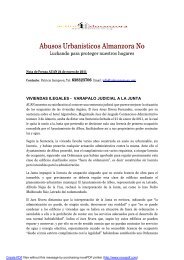European Property Rights and Wrongs - Diana Wallis MEP
European Property Rights and Wrongs - Diana Wallis MEP
European Property Rights and Wrongs - Diana Wallis MEP
Create successful ePaper yourself
Turn your PDF publications into a flip-book with our unique Google optimized e-Paper software.
The Valencian legislators need to be able to explain why the same aim has<br />
been achieved elsewhere is Spain by less draconian means. Beyond that the solution<br />
has to be tested in the particular fact situation, so even if the legislation passes<br />
muster in general, it still remains to be seen whether the particular application<br />
of it is proportionate. Just two examples from the case-law may suffice to suggest<br />
the sort of issues that need to be considered. In Perdigão v Portugal (application<br />
24768/06, Gr<strong>and</strong> Chamber, November 16th 2010) compensation paid to the<br />
Perdigãos when some of their l<strong>and</strong> fell in the path of a new motorway was completed<br />
absorbed by the court costs involved in challenging the process, <strong>and</strong> they<br />
ended up out of pocket to the tune of €15,000. Their burden was excessive, the<br />
fair balance between private <strong>and</strong> public interests having been upset. In Katikaridis<br />
v Greece (application 19385/92, November 15th 1996), compensation for road<br />
works was reduced arbitrarily by the value of a fifteen metre strip to take account<br />
of the benefit derived by the adjoining owners from road works; this automatic<br />
reduction in proper compensation irrespective of the real depreciation caused by<br />
the work also upset the appropriate balance. This case has some of the flavour of<br />
the complaints from Valencia that owners are being required to pay developers<br />
for the installation of infrastructure they do not want.<br />
In the final analysis, each case turns on its facts, <strong>and</strong> although the Valencia<br />
law will probably withst<strong>and</strong> wholesale challenges it may still give rise to a residue<br />
of cases where an intolerable burden has been imposed on individual l<strong>and</strong>owners.<br />
Demolition of buildings<br />
infringing coastal planning rules<br />
The approach to properties built illegally in coastal zones was settled by a majority<br />
vote (13:4) of the Gr<strong>and</strong> Chamber of the <strong>European</strong> Court of Human <strong>Rights</strong><br />
in Depalle v France (application 34044/02, March 29th 2010). This concerned a<br />
house on the northern shore of the Golfe du Morbihan built sometime in 1880s<br />
partly on the public foreshore. The Depalles bought the house in 1960s, the striking<br />
feature of this being that the purchasers bought in good faith – believing<br />
reasonably that they acquired a valid title. It was in fact void because French law<br />
did not allow the private acquisition of public l<strong>and</strong>. (The court would have given<br />
short shrift to the owner of a house recently built illegally along the coast <strong>and</strong><br />
particularly if it had knowingly been erected a building without a permit, see<br />
53



